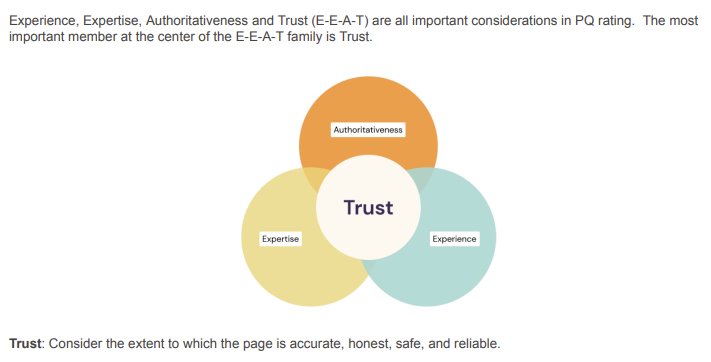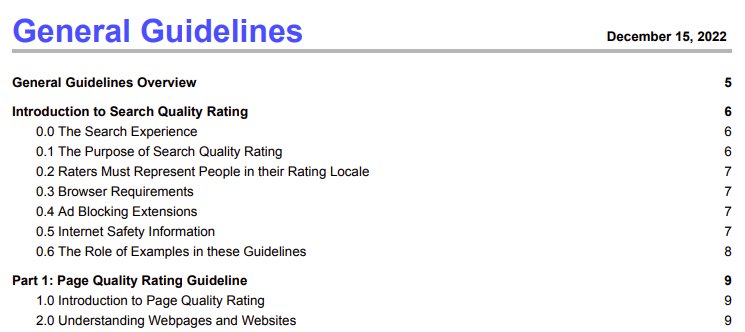Google Adds Experience to E-A-T

- The Expertise of the creator of the content.
- The Authoritativeness of the creator of the content and the website itself.
- The Trustworthiness of the content creator and the website.
This can also apply to news sites, politics and voting, health & fitness, science, government, legal issues, social services, banking and taxes.
All focused on human wellbeing and health. Anything that impacts a person's health, happiness, financial security or safety.
E-A-T is no longer used solely in evaluating content in YMYL topics, it has moved into areas of less importance.
Google rewards pages that are high quality and helpful to all users.
To do that they try to identify who is responsible for the website, the content and what experience and expertise they have on the subject.
As for who is responsible for the website, private WhoIs information may be a sign of “something to hide”. Using Privacy Protection on your website won't necessarily hurt you, but if Google sees it on multiple websites connected to the same people, it may result in further scrutiny.
Google adds an E to E-A-T
Google's new update to its quality raters guidelines add experience to the mix. It's a significant update, adding 9 pages to their guidelines.
Google says, “content also demonstrates that it was produced with some degree of experience, such as with actual use of a product, having actually visited a place or communicating what a person experienced?”
That means first-hand, life experience on the topic.
This is part of Google's ongoing study to better understand user intent.
As an example Google states, “if you’re looking for information on how to correctly fill out your tax returns, that’s probably a situation where you want to see content produced by an expert in the field of accounting.
But if you’re looking for reviews of a tax preparation software, you might be looking for a different kind of information — maybe it’s a forum discussion from people who have experience with different services.”
Another example was comparing an affiliate marketing site, like "Joe's Appliance Reviews" vs Consumer Reports.
Is Joe 19 years old and living in his parent's basement?
Has he actually bought all 37 refrigerators, 26 stoves, 29 microwave ovens and 33 washing machines he's reviewed?
Google values the experience and expertise and tell their quality raters to define who created the content.
“Start by finding out who is responsible for the website and who created the content on the page... Then, look for information about the website and/or content creators on the website itself.”
Post that in an author bio at the bottom of the page and consider using it on your Staff or About pages.
It's also a good idea to link from your profile to other sites that mention you and to content that you've created on other sites.
Google values the reputation of website and content creators.
Initially they will determine if the website is a hobbyist site or corporate.
It's all about Trust.
So, Experience is the new kid on the block, but Google reminds us that the most important element of E-E-A-T is Trust.
Google states that “trust” is at the center of this concept and is the “most important member of the E-E-A-T family.”

They begin by determining if the website is a hobbyist site or corporate. They will want to know what kinds of transactions are being used and who is behind those payment systems.Is the site supported by volunteers or by professionals? What types of ads are being run?
Perhaps most importantly, they evaluate the quality of the content on the who site and individual pages.
“For most pages, the quality of the MC can be determined by the amount of effort, originality, and talent or skill that went into the creation of the content.”
They are focusing more on both the amount of effort that went into the content and the originality of that content.
"Reputation research should be performed according to the topic of the page. For example, if the page contains medical information, research the reputation of the website and content creator for providing medical information. It's possible for a website to be a go-to source for one type of content (e.g., humorous videos), but an untrustworthy source for a different type of content (e.g., financial information).
A website's or content creator's reputation can also help you understand what a website or content creator is best known for. For example, newspapers may be known for high quality, independent investigative reporting while satire websites may be known for their humor. An individual journalist (content creator) may be known for the clarity of their scientific articles while a food blogger (content creator) may be known for the deliciousness of the recipes they post online."
Google also looks for signs that the content creator lacks any qualifications related to Experience, Expertise, Authority or Trust relative to the content. Shopping pages with little or no customer service information is a bad signal.
Reputation is important in the trust department. But other considerations include:
- How accurate, honest, safe and reliable is the content?
- How secure are your online payment system?
- How reliable is your customer service?
- Are your reviews honest and written and written to help make good purchasing decisions and not just sell products?
Maybe someday Google will add "O" for originality to E-E-A-T. Quality content not found anywhere else appears to have a positive impact on search ratings.
Frequently Asked Questions About E-A-T
Is E-A-T a Google Ranking Factor?
The answer is a little confusing. While E-A-T is not a ranking factor technically, it can have an impact on Page Rank.
E-A-T is a guideline for their third-party human quality evaluators. There are no patents related to E-A-T.
And bear in mind that some SEOs think it's one of the most important ranking factors on the planet. Others say E-A-T and now E-E-A-T is overblown.
But Google does use Artificial Intelligence to weed out low-quality product reviews.
They study on-page signals that may indicate Experience, Expertise, Authority and Trust...as well as their opposites.
How to Improve Your E-E-A-T
Getting mentions on reputable and authoritative websites. Google's Quality Rater’s Guidelines state:
“For YMYL informational topics, the reputation of a website or content creator should be judged by what experts in the field have to say. Recommendations from expert sources, such as professional societies, are strong evidence of a very positive reputation.”
You can use link-tracking tools to find quality, reputable websites by reverse-engineering the backlink profile of the top-ranking results.
You can then contact those sites requesting a link to your site or blog content; either a blog post or a resources page.
If you're mentioned in a newspaper or magazine article or if you guest on a podcast, a link from that content will help your expertise, experience and authority profile. And it may influence trust.
Invite real experts for interviews. Interview them to get valuable, reputable information. Then, use the information to create top-quality content. You can repurpose it any way you like; blog post, YouTube, podcast and even social media.
The content not only helps build your street cred for both Google and and site visitors, but if the subjects of your interview have followers, they can help market your content to their audiences.
Win - Win!
You can interview more than one expert at a time. Roundtable discussions with 5, 10 or more experts will delight your readers/listeners and built your E-E-A-T.
You can ask one question of each or them or ask more for future pieces of content.
Conclusion
Google is heavily focused on delivering the best content based on searcher intent. If you're working on your taxes, do you want content created by an accountant or a tax preparer?
Their Quality Rater Guidelines show more focus on ‘Finding Who is Responsible for the Website and Who Created the Content on the Page’ for different webpage types.
They expanded guidance on the following core pillars of Page Quality Rating:
‘Main Content Quality’
‘Reputation for Websites and Content Creators'
‘Experience, Expertise, Authoritativeness, and Trust (E-E-A-T)’
There is a focus on Trust, which may include Experience and Expertise. How do you prove that?If you say it, it’s bragging. If someone else says it, it must be true. Make sure that Google and your audience are aware by linking to content that highlights your Experience, Expertise, Authoritativeness and Trust.

Kurt Scholle has been building and marketing successful websites for over 25 years in a wide range of markets.
Follow him on Twitter or LinkedIn.
Can he help your organization? Schedule a Call to find out!



